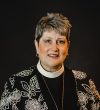- In 2018, Living Lutheran shared the story of Paradise (Calif.) Lutheran Church and the loss of its parsonage in the Camp Fire. Since then, the congregation has found a new purpose for the site. Photos: Courtesy of Paradise Lutheran Church
- Paradise Lutheran is rebuilding its parsonage after the Camp Fire in 2018 using noncombustible materials to reduce entry points for embers.
- Abbey Place, a “Q Cabin,” includes four two-bedroom, two-bathroom apartments that the congregation will rent at market rates.
Some people say Paradise, Calif., ceased to exist on Nov. 8, 2018. That was the day the Camp Fire—the most destructive wildfire in California history—sparked about 10 miles north of town and within six hours had raced through Paradise, claiming more than 90% of its buildings.
But three and a half years later, members of Paradise Lutheran are overseeing reconstruction of their parsonage, which was destroyed in the fire. The new, $1 million building, to be called Abbey Place, also brings the congregation a change in mission, a new way to serve their neighbors while also providing income to the church.
Abbey Place is being built as a “Q Cabin,” a sustainable, disaster-resistant, all-steel construction with the arch of a Quonset hut, the prefabricated structure introduced during World War I. The Quonset hut isn’t fireproof, but it is fire-resistant, built to withstand intense heat.
The building will include four two-bedroom, two-bathroom apartments that will rent at market rates, providing an income stream that the congregation hopes will sustain the church as it recovers from its membership loss after the fire.
Gwen Nordgren, congregation council president, said the Abbey Place project has been 12 years in the making. Originally the congregation hoped to replace or renovate the parsonage to create senior housing, but couldn’t fund it. After the fire, members decided to use the insurance settlement and an existing endowment to build the apartments. The fire, she explained, changed the project’s scope because rental housing needs in Paradise have shifted from seniors to families.
From change to new life
The Camp Fire forever changed Paradise, a town in the Sierra Nevada foothills. In 2018 the population was 26,000, but the 2020 Census counted fewer than 5,000 people. The fire also changed the church. One member died in the fire and many others lost their homes. Before the blaze, Paradise Lutheran had more than 80 active members, Nordgren said, but now there are only 35.
“When the fire hit, our congregation was predominantly seniors,” Nordgren said. “Of those people, once their homes were gone, they left and didn’t come back.” She said many moved out of state to be closer to their children or found senior housing elsewhere.
The fire may have destroyed the parsonage but not the church campus across the street. The church building, a fellowship hall rented for special events and an office complex with two apartments were spared.
“It’s amazing what a handful of people can do.”
Nordgren believes those structures survived only because parking lots along the church’s property line were used as a staging area for fire trucks. As firefighters rained water onto nearby flames, enough fell on those buildings to protect them. But the fire came so close, she said, that a newly built fence behind the buildings burned, with only one post remaining. There was also significant smoke damage inside the church. Carpets had to be pulled up, and wooden pews were trashed. The charred roof of the office building had to be replaced.
Nordgren, who lost her home in the fire, said she couch-surfed for a while and then leased a one-bedroom apartment in the church’s office building for a year before she found permanent housing.
After the fire, the congregation took about three months to reestablish the office. Because the town had no clean water, one of the first projects was to install a water-purifying system. Nordgren said that living on the campus made it convenient for her to manage the workers who cleaned and painted the building, replaced carpets and put new chairs in the sanctuary. Worship returned to the building in summer 2019.
Nordgren said the church’s pastor, who had planned to retire, stayed through the initial cleanup of the property and the first year of the COVID-19 pandemic, finally retiring in spring 2021. Since then, worship has been led by a nearby Episcopal priest and by parishioners.
Nordgren sees signs of new life in her community, her church and even herself. The town continues to rebuild, and the congregation has welcomed new members, including some families.
Through her work with the congregation, Nordgren found new purpose: “This is my vocation, helping the church. What a gift this has been for me to have a purpose. I’m thankful to God for that.”
Those who remain at Paradise Lutheran have formed a “very tight, very loving community,” she said, bonding in both the tragedy of loss and now the rebuilding: “It’s amazing what a handful of people can do.”






